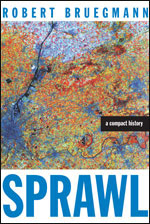Don't confuse prevalence of sprawl with desirability

is the title of a column by Inga Saffron, the great urban design writer for the Philadelphia Inquirer. It is a response to the new book, Sprawl: A Compact History. From the article:
Robert Bruegmann challenges the orthodoxy of what he calls the "anti-sprawl reformers" - those Cassandras who would stop the march of subdivisions through the landscape, banish big-box emporiums, and detangle highway cloverleafs. Bruegmann, who teaches in the art history department, has received mostly sympathetic responses to his book, which might have easily been titled, Sprawl: The Bright Side.
At first glance, Bruegmann's book gives the appearance of being an objective historical survey. He comes with an impeccable urbanist pedigree: A professor at a downtown Chicago university. Resident of that city's Lakeview neighborhood. Ph.D. from the University of Pennsylvania. But the book is, in fact, a polemic on behalf of unfettered, free-market development, wherever it might be...
The problem is how Bruegmann proceeds from there. If people choose to live in sprawling suburbs, he suggests, then sprawl must be a good thing. Anyone who tries to critique that lifestyle is simply an elitist snob or a puritanical hairshirt hellbent on trying to keep middle-class strivers from enjoying the great American dream.
The attack on so-called elites should set off alarm bells. Are people who have moved to the exurban frontier for the sake of the kids really happy with the sprawl that forces them to spend more time commuting than parenting? And the fact that Americans desire something doesn't mean it's the best policy. As a nation, we have a record of believing we can have it both ways: gas-guzzling SUVs and independence from foreign oil, low taxes and more services, french fries and good health. Even if it's true that the fat won't get you, the calories surely will...
If cities could also match the suburbs with amenities, they'd give them a run for their money. Unfortunately, the regulatory deck has long been stacked against cities. Bruegmann is right that some people will always gravitate to the next suburban frontier. But that doesn't mean our government policies should encourage them.
Similarly, a commentary from New Urban News, makes a similar argument about the writings of suburban apologist and writer Joel Kotkin, in "The strange career of an "urban expert": Joel Kotkin pops up seemingly everywhere... But if he is an expert, he uses his knowledge largely to fight whatever policies and designs are likely to make urban life better."
 George Kochaniec Jr. © Denver Rocky Mountain News.Richard Florida, left, author of The Flight of the Creative Class, and Joel Kotkin, author of The City: A Global History.
George Kochaniec Jr. © Denver Rocky Mountain News.Richard Florida, left, author of The Flight of the Creative Class, and Joel Kotkin, author of The City: A Global History. Index Keywords: sprawl; car-culture



0 Comments:
Post a Comment
<< Home